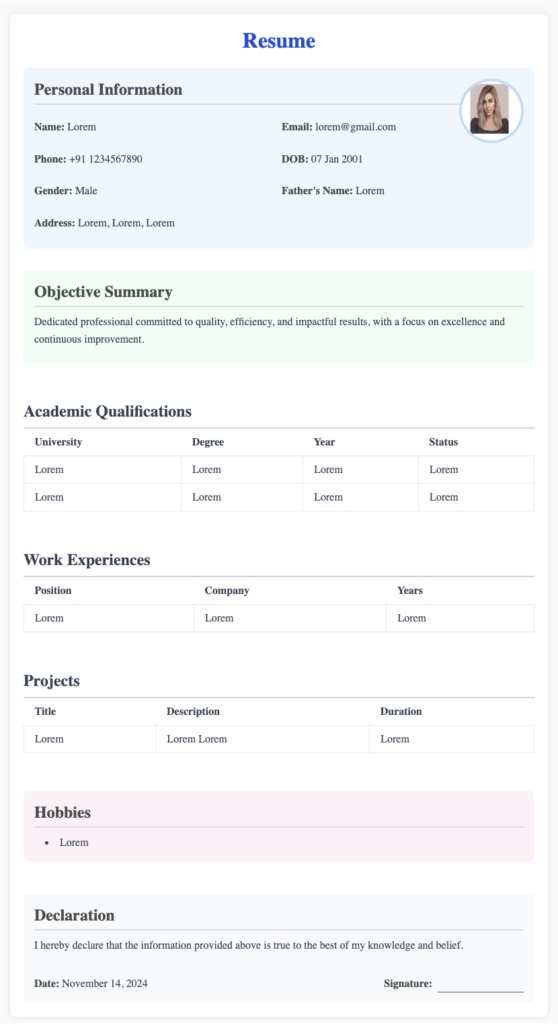Resources/Resume-Guide/Medical Interpreter
Medical Interpreter Resume Guidance
Medical interpreters facilitate the exchange of communication between healthcare specialists and patients. Applying for these jobs typically requires you to create a resume that demonstrates you have the necessary language skills and basic medical understanding to perform the role effectively.
1. Contact Information
- Full Name
- Phone Number
- Email Address
- LinkedIn Profile (optional)
- Professional Website or Portfolio (if applicable)
2. Professional Summary (3–4 sentences)
Summarize your qualifications, language pairs, years of experience, and key strengths.
Example:
“Certified Medical Interpreter with over 5 years of experience bridging communication between healthcare professionals and diverse patient populations. Fluent in English and Spanish, with deep knowledge of medical terminology, HIPAA compliance, and cultural sensitivity. Skilled in simultaneous and consecutive interpretation, ensuring accurate and compassionate communication in high-pressure clinical settings.”
3. Key Skills
Include both hard and soft skills relevant to medical interpretation:
- Bilingual/Multilingual (specify languages and proficiency levels)
- Medical Terminology (specialized fields like cardiology, oncology, etc.)
- Simultaneous and Consecutive Interpretation
- Written Translation (if applicable)
- Active Listening
- Cultural Competence
- Knowledge of HIPAA Regulations
- Professionalism and Confidentiality
4. Certifications (Include issuing body and year)
- Certified Medical Interpreter (CMI) – National Board of Certification for Medical Interpreters (NBCMI)
- Certified Healthcare Interpreter (CHI) – Certification Commission for Healthcare Interpreters (CCHI)
- Other relevant certifications (e.g., translation certifications, language proficiency tests)
5. Professional Experience (Reverse chronological order)
List relevant roles with accomplishments demonstrating your skills.
Example:
Medical Interpreter
[Organization Name] – [City, State]
[Month/Year] – Present
- Provide simultaneous and consecutive interpretation for patients and healthcare providers in clinical, emergency, and administrative settings.
- Translate medical documents such as discharge instructions, consent forms, and patient education materials.
- Assist in ensuring cultural sensitivity and understanding during medical consultations.
- Maintain strict confidentiality and adherence to HIPAA regulations.
- Trained new interpreters on organizational policies and interpretation best practices.
Achievements:
- Successfully interpreted for over 2,000 patient encounters annually.
- Contributed to improved patient satisfaction ratings by 15% through effective communication facilitation.
6. Education
- Degree(s) earned (e.g., Bachelor of Arts in Linguistics or related field)
- Relevant coursework (e.g., medical terminology, cross-cultural communication)
- Name of Institution, Graduation Date
7. Additional Sections (Optional)
- Volunteer Experience: Interpretation work for non-profits or community health organizations.
- Languages: Detailed proficiency levels (e.g., Native, Fluent, Advanced).
- Professional Development: Workshops, webinars, or specialized medical interpretation training.
- Technical Skills: Familiarity with tools like CAT software, telehealth platforms, or medical apps.
Tips for Success:
Proofread: Avoid errors—your resume should reflect your attention to detail.
Tailor Your Resume: Focus on the requirements in the job description.
Use Metrics: Quantify achievements (e.g., number of encounters, languages interpreted, or training sessions led).
Highlight Soft Skills: Showcase cultural competence and ability to handle sensitive situations.

Recent Categories
- General
- Accountant
- Actor/Actress
- Administrator
- Advertising Executive
- Aerospace Engineer
- Agricultural Engineer
- Air Traffic Controller
- Aircraft Mechanic
- Ambulance Driver
- Animator
- Architect
- Artist
- Astronomer
- Athlete
- Attorney/Lawyer
- Audiologist
- Author
- Baker
- Banker
- Barista
- Bartender
- Biologist
- Biomedical Engineer
- Bookkeeper
- Brand Manager
- Bus Driver
- Business Analyst
- Butcher
- Carpenter
- Chef
- Chemical Engineer
- Chemist
- Chiropractor
- Civil Engineer
- Claims Adjuster
- Clinical Psychologist
- Coach
- Computer Engineer
- Computer Operator
- Copywriter
- Cosmetologist
- Costume Designer
- Court Reporter
- Dancer
- Dental Assistant
- Dentist
- Dermatologist
- Detective
- Dietitian
- Director
- Dispatcher
- DJ
- Doctor
- Economist
- Editor
- Electrician
- EMT
- Engineer
- Environmental Scientist
- Event Planner
- Executive Assistant
- Fashion Designer
- Film Director
- Financial Advisor
- Firefighter
- Fitness Trainer
- Flight Attendant
- Florist
- Forensic Scientist
- Game Developer
- Gardener
- Geologist
- Graphic Designer
- Hair Stylist
- Handyman
- Health Educator
- Home Inspector
- Hotel Manager
- HR Manager
- Illustrator
- Industrial Designer
- Information Security Analyst
- Insurance Agent
- Interior Designer
- Interpreter
- Investment Banker
- IT Manager
- Journalist
- Judge
- Laboratory Technician
- Landscaper
- Librarian
- Linguist
- Loan Officer
- Lobbyist
- Locksmith
- Logistician
- Makeup Artist
- Manager
- Marine Biologist
- Market Research Analyst
- Massage Therapist
- Mathematician
- Mechanic
- Medical Assistant
- Medical Biller
- Medical Coder
- Medical Interpreter
- Medical Transcriptionist
- Meteorologist
- Microbiologist
- Model
- Mortician
- Musician
- Nanny
- Network Administrator
- Nurse
- Nutritionist
- Occupational Therapist
- Office Manager
- Optician
- Optometrist
- Painter
- Paralegal
- Paramedic
- Pediatrician
- Personal Trainer
- Pharmacist
- Phlebotomist
- Photographer-option
- Publisher
- Radiologist
- Real Estate Agent
- Receptionist
- Recreation Worker
- Recruiter
- Registered Nurse
- Reporter
- Research Scientist
- Respiratory Therapist
- Retail Salesperson
- Robotics Engineer
- Sales Manager
- School Counselor
- Scientist
- Secretary
- Security Guard
- Server
- Set Designer
- Social Worker
- Software Developer
- Speech Pathologist
- Statistician
- Stockbroker
- Stylist
- Surgeon
- Surveyor
- System Administrator
- Tax Preparer
- Teacher
- Technical Writer
- Telecommunications Specialist
- Therapist
- Tour Guide
- Translator
- Truck Driver
- Ultrasound Technician
- Urban Planner
- Usher
- Veterinarian
- Video Editor
- Waiter/Waitress
- Web Developer
- Welder
- Writer
- Yoga Instructor